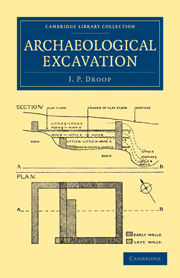Summary
THE time has perhaps gone by when it was necessary, if it ever were, to put forward a defence of the pleasant practice of digging, a defence of it, that is to say, not as a harmless recreation of the idle rich, but as a serious business for a reasonable man. In all ages the maker of history and the recorder of history have alike received due honour. To-day a place is found, not equal, of course, in glory but in the same hierarchy, for the reverent discoverer of the dry bones of history; and on Clio's roll of honour next to Homer and Agamemnon there is now a place for Schliemann.
In the last forty years excavation has been carried on very extensively in Italy, in Greece, and in Egypt, to say nothing of the work that has been done in the more northern countries of Europe, or in fields further to the east; and the time has come when it may be of some interest to set forth the principles that have been, or at least should have been, the basis of the work.
The reservation must be made; for in Greece, at least, and in Egypt it was unavoidably, but none the less deplorably, the case that the great men of the past lacked the experience that is now ours. Excavation, like surgery, is an art, but, unlike the surgeon, the excavator has no unlimited supply of new subjects ready to benefit by his growing skill.
- Type
- Chapter
- Information
- Archaeological Excavation , pp. vii - xPublisher: Cambridge University PressPrint publication year: 2010First published in: 1915

